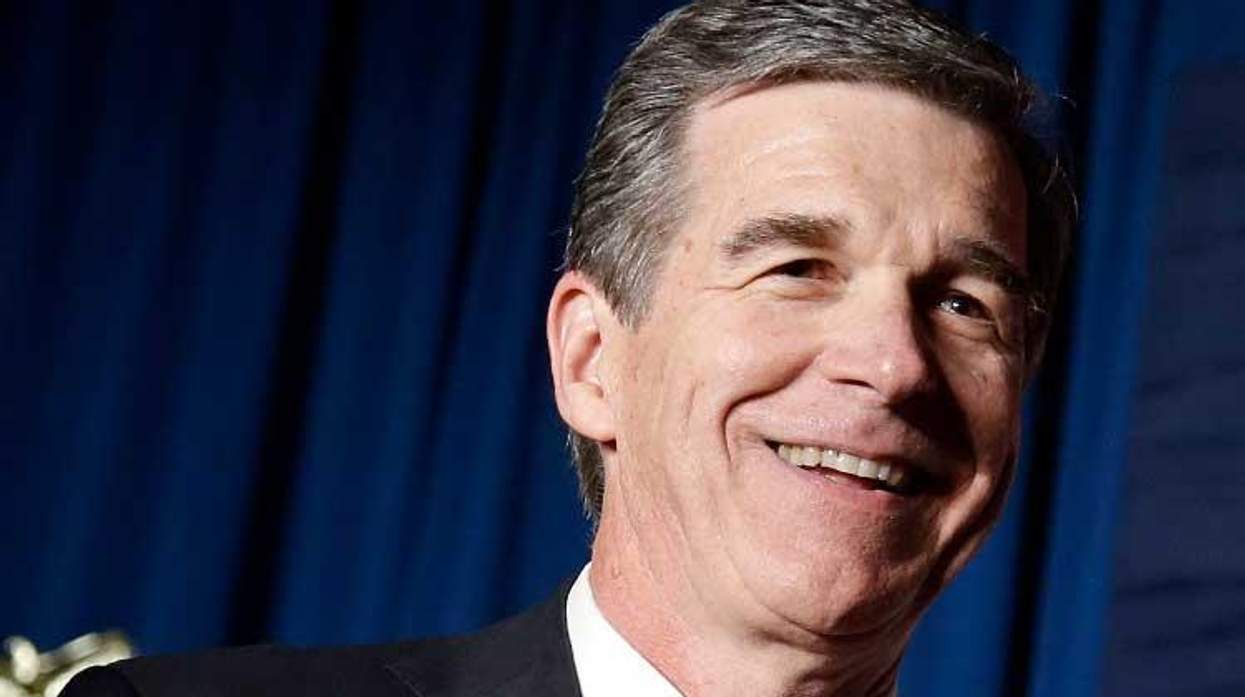Roy Cooper is the new governor-elect of North Carolina. On Tuesday, the Democrat addressed supporters gathered at North Carolina State's McKimmon Center, saying that after weeks of a recount that stalled the outcome of the painfully close 2016 election, it's time to nullify North Carolina's anti-LGBT law.
"With this election, North Carolina is on its way to repairing its reputation," Cooper told the crowd, which packed the room to hear his speech. "Let's finish the job and repeal HB 2."
House Bill 2 was pushed through the legislature in March during an emergency session. Introduced, debated, and signed into law in a single day, the legislation forces trans people to use public restrooms that do not correspond with their gender identity when visiting government buildings and schools. It also blocks municipalities from enacting or enforcing LGBT-inclusive nondiscrimination laws.
The sitting governor, Pat McCrory, strongly supported the law and stood by it, even as it did extreme harm to the state.
Following the passage of HB 2, over 200 business condemned the law, while the NCAA and Atlantic Coast Conference pulled championship games scheduled in the state. The NBA further announced that it would be moving the All-Star Game from Charlotte, a move that was estimated to cost the state $100 million.
For each year the law remained on the books, the Williams Institute, a pro-LGBT think tank at the University of California, Los Angeles, estimated it would cost the state $5 billion.
Cooper, the attorney general who refused to defend HB 2 in court, ran against the anti-LGBT legislation, calling it bad for the state. Voters agreed. Exit polls showed that two-thirds of voters believed that HB 2 had harmed the state, and Cooper said Tuesday that it was time to start mending the damage done.
"I want to make sure North Carolinians are healthy, physically and mentally, that law enforcement is strong and fair, that women and their rights are respected, that voting is easier," Cooper said, nodding to the suppression of the black vote in North Carolina, "that local governments have more freedom to shape their own policies and that middle-class taxpayers and small businesses are the ones who get the breaks."
Many in the crowd hoped Cooper's victory would be a fresh start for the embattled state.
"Maybe we can get our ACC tournament back, our NCAA games back," added Phil Cooper, a supporter who is no relation to the governor-elect, in an interview with Durham's WTVD.
That may be easier said than done. While the governor-elect supports the repeal of HB 2, he will face a major challenge from the state's Republican Party, which boasts a supermajority in both houses of the state General Assembly. Although a handful of the conservative legislators who voted for HB 2 have since changed their position, arguing for its repeal, that's not enough for a majority.
"I think cautiously optimistic is the word here," Ben Graumann, development manager for Equality North Carolina, told TV station WRAL, adding, "I think we're calling on those Republicans who have come out during the election against HB 2."
One option that's on the table is a compromise that would compel Charlotte to repeal its nondiscrimination ordinance in return for the state striking down HB 2. That ordinance, which passed the City Council last February, unintentionally triggered statewide backlash. The legislation allows trans people equal access in all public accommodations, including housing, employment, city parks, museums, and restrooms.
While the state decides what action to take, right-wing groups are already gearing up to protect HB 2.
"We want to put Governor-elect Cooper on notice that the citizens of North Carolina will not stand for any attempt by out-of-state interests to fundamentally change our values or compromise the privacy and safety of our children," said Tami Fitzgerald, executive director of the North Carolina Values Coalition, in a press release.
Cooper, however, maintained that he's prepared for the fight to come.
"I can't wait to get started," the governor-elect said in the closing of his speech. "Enjoy tonight. For tomorrow, we get to work."




































































Charlie Kirk DID say stoning gay people was the 'perfect law' — and these other heinous quotes